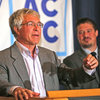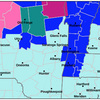Poet Slade says: ‘We need to celebrate love and get to know one another’
In the way most of us breathe air — an essential intake to sustain life — Leonard A. Slade Jr. breathes poetry.
He inhales the works of Chaucer and Shakespeare, Edgar Allan Poe and Langston Hughes, and breathes life into their words as he recites them as naturally as if he were exhaling. Their words, entwined in his thoughts, his very identity, flow naturally in conversation.
Slade writes his own poetry, reams of it, imbued with what he has learned from a lifetime of reading literature but uniquely and personally his.
He begins this week’s Enterprise podcast by reciting “The Black Madonna,” a tribute to his mother:
picking cotton on
a cold day blisters
decorated her black fingers
in the fields
She crawled on her knees
until the sun bowed
to her. Nine children
planted beneath the stars
the earth felt good to her.
You can see her now
a parched face and folded hands
she kneels in a different place
drinking blood and eating bread
at the altar
Comforted
white gloves feel good to her
waving to touch the sky
hymns fill the air
They feel good to her
They feel good to her
That poem is published in the most recent book of poetry written by Slade, his 22nd, “Selected Poems of Freedom, Peace, and Love.”
He wrote “The Black Madonna” in the booth of a shopping mall restaurant, believing the divine spirit dictated it to him.
Later, he read it at an occasion in North Carolina, his native state, with his mother in the audience. “She cried. She was so touched and moved,” he said. “I just felt the need … to celebrate her hard work on our farm where my mother and father worked — and sent all nine children to college.”
Slade describes working in the fields from sunrise to sunset. His father taught his nine children “to respect the work ethic and that no one is going to give us anything. And whatever we got in life, we would have to work for.
“And don’t go out here having this sense of entitlement and don’t use excuses: You are Black and oppressed …. You can do whatever the Lord wants you to do.”
The Slade family went to church every Sunday with prayer meetings in between, read the Bible at the breakfast table, and gave grace at every meal.
Their pastor, the Reverend Paul Bishop, “would bring this notion to his congregation: Parents, send your children to college …. He was a visionary,” said Slade.
Slade and his eight younger siblings all completed college, each with different courses of study. “My parents did not dictate to us what we should major in, and they gave us that freedom and that choice.”
All nine Slade children married and stayed married. “I think that is unusual in 2023,” said Slade. “My wife and I have been married for 55 years. She is my best friend and I would not be where I am if it were not for her and for my parents.”
Slade started his college education at Elizabeth City State University in North Carolina with the idea of becoming an elementary school teacher. When he told his professor, Edythe Scott Bagley, of his plans, she responded, “No, you’re not. You’re going to major in English.”
“She was very dramatic,” Slade said of Bagley, a civil rights activist and author, the older sister of Coretta Scott King.
“She became my mentor,” said Slade. He was the only student to receive the grade of A in her honors English class. “She believed in me.”
Slade continued his studies, earning a master’s degree at Virginia State and a Ph.D. from the University of Illinois at Urbana-Champaign, in each place developing close relationships with professors who mentored him, sometimes for decades.
He credits his success to “the mentoring, the guidance, the prayers of parents, and the encouragement of teachers … the strong sense of community.”
Some of his professors were hard on him. “There were times, of course, when things were tough, challenging,” said Slade. “But I always remembered that poem by Langston Hughes, who influenced me and whose works I admire. And I love the “Mother to Son” poem, he says, as he begins reciting:
Well, son, I’ll tell you:
Life for me ain’t been no crystal stair.
It’s had tacks in it,
And splinters,
And boards torn up,
And places with no carpet on the floor—
Bare.
But all the time
I’se been a-climbin’ on,
And reachin’ landin’s,
And turnin’ corners,
And sometimes goin’ in the dark
Where there ain’t been no light.
So boy, don’t you turn back.
Don’t you set down on the steps
’Cause you finds it’s kinder hard.
Don’t you fall now—
For I’se still goin’, honey,
I’se still climbin’,
And life for me ain’t been no crystal stair.
Rather than his professors, Slade credits his wife, Roberta Hall Slade, with his becoming a poet. He started his teaching career writing essays for literary journals, vividly recalling one on the use of biblical allusions in John Steinbeck’s “The Grapes of Wrath.”
Slade was working as a dean at Kentucky State University while his wife was getting a graduate degree in musicology at the University of Chicago and heard some of the poets there. “Your writing is just as good, if not better,” she told him.
“My wife saw the potential in me,” Slade said, surmising that, if not for her, he would have continued writing literary criticism rather than poetry. “She thought I was creative and that I had a way with language and I could write poems for her. I have about four or five books about her, and I celebrate our love, my love for her.”
Slade said he was “pleasantly surprised” when journals accepted his poems for publication and soon had enough to publish his first book, “Another Black Voice: A Different Drummer.”
In a review at the time, in 1988, Richard K. Barksdale wrote: “Professor Slade has not only conquered what is considered to be normal professional inertia against creativity, but he has published a very fine volume of poetry.”
Slade went on to become a professor of Africana studies at the University of Albany, describing himself as “a dramatic teacher.” While he says a good professor must have mastery of his subject, “A teacher must enter the classroom with a message. She must prepare and must be willing to share with his or her students, with an equity, a wealth of knowledge.”
Slade, now a professor emeritus at the University at Albany, says, “I don’t remember students going to sleep in my class. I tried to inspire them to learn … to teach them the power and beauty of language and literature.”
He gives the example of Geoffrey Chaucer, who wrote in Middle English, and recites from the Prologue to the Canterbury Tales:
Whan that Aprille with his shoures soote,
The droghte of March hath perced to the roote,
And bathed every veyne in swich licóur
Of which vertú engendred is the flour ….
“I try to get my students to see how our language has changed since Chaucer’s time,” said Slade, adding that the admiration he had for his professors helped him to use “myriad methods” in his own teaching.
His more than half a century as a full-time professor earned him many awards and accolades. Slade takes pride in his students who have gone on to get doctoral degrees, earn law degrees, or become ministers. “And a couple of my students who became university presidents, I’m so proud of them.”
Slade went on, “That’s what it’s all about, helping the next generation be great in their work … so that they can make changes in their communities and so that they can help make our world a better place.”
He recently gave a speech at a Phi Beta Kappa induction ceremony, during which he was made an honorary member of the prestigious academic honor society. His speech was about the importance of a broad, liberal arts education, which of course includes poetry.
“What is poetry?” asks Slade, answering his question with a thought from Edgar Allan Poe that it is the rhythmic creation of beauty whose purpose is to elevate the soul.
Slade then recites Poe’s poem “To Helen”:
Helen, thy beauty is to me
Like those Nicéan barks of yore,
That gently, o’er a perfumed sea,
The weary, way-worn wanderer bore
To his own native shore ….
Slade believes that the greatest force in life, and in his own poetry, is love. He concluded the Enterprise podcast by reciting his poem that begins, “I am a Black man/ my history written with blood ….”
But the poem ends with these words of healing: I am a Black man/ proud as a Lombardy poplar/ stronger than grandaddy’s roots/ defying place/ and time/ and history/ crucified/ alive/ immortal/ Look at me and be/ healed.
Slade says what pervades many of his poems is “an appeal by this poet for us to love one another. All of us who may have differences. Yet we may have commonalities.
“And we need to celebrate love and get to know one another and be a community where we work together and pray together and rejoice together.”



